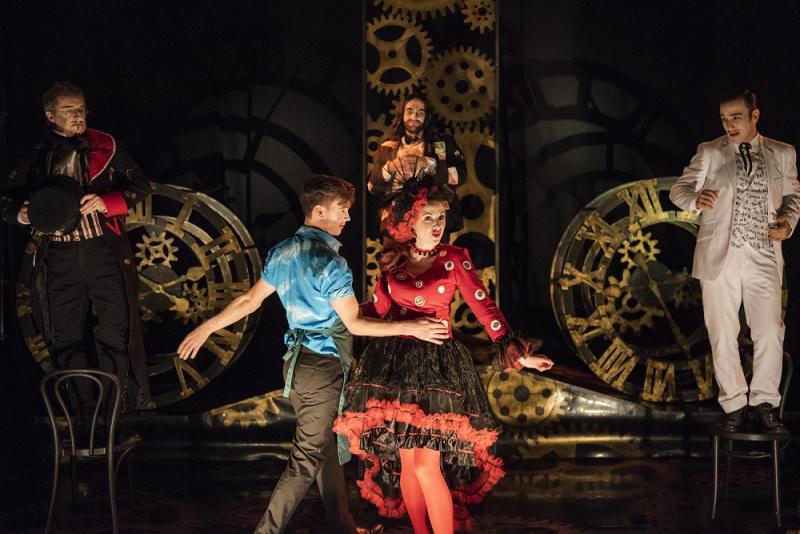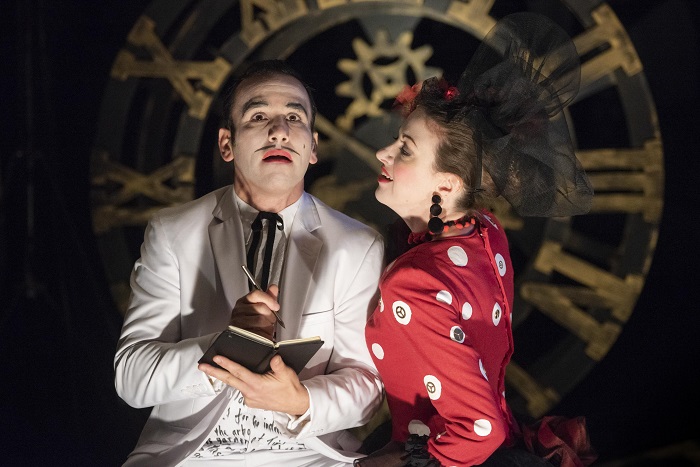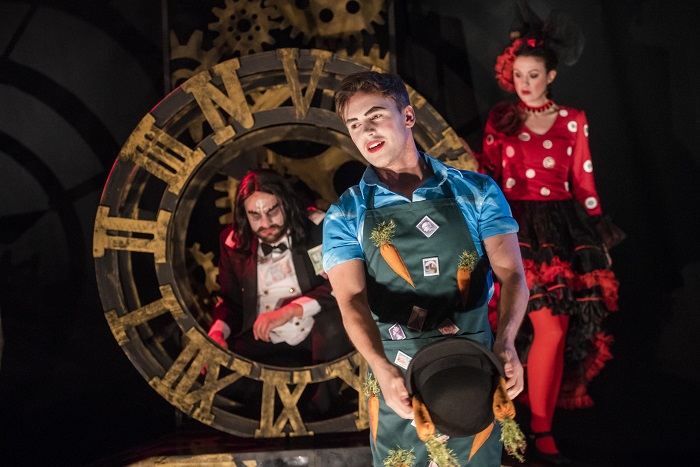L'heure espagnole, Mid Wales Opera review - Ravel goes like clockwork | reviews, news & interviews
L'heure espagnole, Mid Wales Opera review - Ravel goes like clockwork
L'heure espagnole, Mid Wales Opera review - Ravel goes like clockwork
Ravel's clock shop farce ticks along delightfully in a small production big on character

Mid Wales Opera makes small-scale touring look fun – even when you suspect that, behind the scenes, it really isn’t. Barely 24 hours before this performance of their current production of Ravel’s L’heure espagnole, and 11 dates into their current 16 date tour, their Torquemada, Peter van Hulle, was invalided out.
That’s part of the genius of this staging: it takes the necessities of touring – the small scale, the limited resources – and turns them into music drama that’s simultaneously intimate and pretty much indestructible. Everything about this production fits together as elegantly as a handmade watch. In the same way that MWO arrives in a town like a troupe of travelling players so, with white faces and stylised cartoon-bright costumes (all designs are by Studer), Ravel’s characters become a commedia dell’arte company. A simple but surprisingly versatile set surrounds them with black and gold cogs, springs and numbers. Well, didn't Ravel himself claim to be "artificial by nature"?
That lover of all things intricate and miniature would surely have been delighted with Jonathan Lyness’s four piece chamber orchestration. A harp for magic, a violin for pathos, a bassoon for humour and a piano to fill out those super-refined Ravel harmonies – it turns out that you don’t really need much more, especially when all four players cheerfully pitch in on percussion to supply the necessary ticks, tocks, chimes and cuckoos (Lyness, directing from the keyboard, popped these softly in on what looked like a tenor recorder). And Studer directs the whole show as a playful piece of choreography – one long, wittily detailed but deliciously artificial pas de cinq. Inspired casting has become a trademark of MWO productions under Studer and Lyness’s leadership, and the whole thing revolved, as it must, around Catherine Backhouse’s spirited Concepcion (pictured above, with Anthony Flaum). Darting about the stage, eyes flashing, she shaped Ravel’s artfully artless lines with an easy grace (the English translation, by turns sly and saucy, is by Studer too), and her voice – silvery and translucent at the top – had a core of satisfyingly sultry darkness.
And Studer directs the whole show as a playful piece of choreography – one long, wittily detailed but deliciously artificial pas de cinq. Inspired casting has become a trademark of MWO productions under Studer and Lyness’s leadership, and the whole thing revolved, as it must, around Catherine Backhouse’s spirited Concepcion (pictured above, with Anthony Flaum). Darting about the stage, eyes flashing, she shaped Ravel’s artfully artless lines with an easy grace (the English translation, by turns sly and saucy, is by Studer too), and her voice – silvery and translucent at the top – had a core of satisfyingly sultry darkness.
Around her, in steadily closer circles, spun the men: and if Anthony Flaum as a white-suited, pencil-moustachioed Gonzalve sounded as if he might be reining it in slightly (and understandably - the front row of audience at the SpArC Theatre in Bishop's Castle is barely two metres away from the singers), he too phrased like he was singing a Poulenc mélodie. Nicholas Morton’s genial, put-upon Ramiro (carrots took the place of donkey ears in his straw hat, pictured below) and Matthew Buswell, whose Don Inigo blustered on with a bass-baritone as dark and juicy as a glass of port, completed an ensemble that combined pantomime physical energy with real musical refinement.  They were all back on for the second half of the evening: a revue-style selection of songs both Spanish (Backhouse sang a hauntingly languid Falla "Nana") and pseudo-Spanish (a selection of arias from Carmen). Flaum finally let his tenor flag fly with "Granada" (in a shimmering, harp led arrangement by Lyness) – a gloriously uninhibited bit of can belto that had the capacity audience all-but out of their seats. Studer set the whole thing up with a droll narration of Alan Ridout’s "Ferdinand the Bull", stepping in again for van Hulle, though the way violinist Edward McCullagh threw off Ridout’s unaccompanied double stops and left hand pizzicati would be impressive on any occasion. (A replacement singer has now been cast to perform Torquemada for the last three dates of the tour).
They were all back on for the second half of the evening: a revue-style selection of songs both Spanish (Backhouse sang a hauntingly languid Falla "Nana") and pseudo-Spanish (a selection of arias from Carmen). Flaum finally let his tenor flag fly with "Granada" (in a shimmering, harp led arrangement by Lyness) – a gloriously uninhibited bit of can belto that had the capacity audience all-but out of their seats. Studer set the whole thing up with a droll narration of Alan Ridout’s "Ferdinand the Bull", stepping in again for van Hulle, though the way violinist Edward McCullagh threw off Ridout’s unaccompanied double stops and left hand pizzicati would be impressive on any occasion. (A replacement singer has now been cast to perform Torquemada for the last three dates of the tour).
The whole company finished with an extremely silly rendition of – what else? - "Y Viva España". Studer and Lyness would no doubt say that MWO’s aim is to entertain new audiences as well as to please regular operagoers. This show does both, though it was the Ravel that really stayed with me; not so much because of the ingenuity with which MWO overcame the limitations of a touring production, but because the result felt so perfectly pitched, and so musically and dramatically satisfying. It’s hard to imagine that Ravel – had he found himself at a loose end on an autumn night in the Welsh Borders – would have been anything other than enchanted. Catch it if you (still) can.
The future of Arts Journalism
You can stop theartsdesk.com closing!
We urgently need financing to survive. Our fundraising drive has thus far raised £49,000 but we need to reach £100,000 or we will be forced to close. Please contribute here: https://gofund.me/c3f6033d
And if you can forward this information to anyone who might assist, we’d be grateful.

Subscribe to theartsdesk.com
Thank you for continuing to read our work on theartsdesk.com. For unlimited access to every article in its entirety, including our archive of more than 15,000 pieces, we're asking for £5 per month or £40 per year. We feel it's a very good deal, and hope you do too.
To take a subscription now simply click here.
And if you're looking for that extra gift for a friend or family member, why not treat them to a theartsdesk.com gift subscription?
more Opera
 Albert Herring, English National Opera review - a great comedy with depths fully realised
Britten’s delight was never made for the Coliseum, but it works on its first outing there
Albert Herring, English National Opera review - a great comedy with depths fully realised
Britten’s delight was never made for the Coliseum, but it works on its first outing there
 Carmen, English National Opera review - not quite dangerous
Hopes for Niamh O’Sullivan only partly fulfilled, though much good singing throughout
Carmen, English National Opera review - not quite dangerous
Hopes for Niamh O’Sullivan only partly fulfilled, though much good singing throughout
 Giustino, Linbury Theatre review - a stylish account of a slight opera
Gods, mortals and monsters do battle in Handel's charming drama
Giustino, Linbury Theatre review - a stylish account of a slight opera
Gods, mortals and monsters do battle in Handel's charming drama
 Susanna, Opera North review - hybrid staging of a Handel oratorio
Dance and signing complement outstanding singing in a story of virtue rewarded
Susanna, Opera North review - hybrid staging of a Handel oratorio
Dance and signing complement outstanding singing in a story of virtue rewarded
 Ariodante, Opéra Garnier, Paris review - a blast of Baroque beauty
A near-perfect night at the opera
Ariodante, Opéra Garnier, Paris review - a blast of Baroque beauty
A near-perfect night at the opera
 Cinderella/La Cenerentola, English National Opera review - the truth behind the tinsel
Appealing performances cut through hyperactive stagecraft
Cinderella/La Cenerentola, English National Opera review - the truth behind the tinsel
Appealing performances cut through hyperactive stagecraft
 Tosca, Royal Opera review - Ailyn Pérez steps in as the most vivid of divas
Jakub Hrůša’s multicoloured Puccini last night found a soprano to match
Tosca, Royal Opera review - Ailyn Pérez steps in as the most vivid of divas
Jakub Hrůša’s multicoloured Puccini last night found a soprano to match
 Tosca, Welsh National Opera review - a great company reduced to brilliance
The old warhorse made special by the basics
Tosca, Welsh National Opera review - a great company reduced to brilliance
The old warhorse made special by the basics
 BBC Proms: The Marriage of Figaro, Glyndebourne Festival review - merriment and menace
Strong Proms transfer for a robust and affecting show
BBC Proms: The Marriage of Figaro, Glyndebourne Festival review - merriment and menace
Strong Proms transfer for a robust and affecting show
 BBC Proms: Suor Angelica, LSO, Pappano review - earthly passion, heavenly grief
A Sister to remember blesses Puccini's convent tragedy
BBC Proms: Suor Angelica, LSO, Pappano review - earthly passion, heavenly grief
A Sister to remember blesses Puccini's convent tragedy
 Orpheus and Eurydice, Opera Queensland/SCO, Edinburgh International Festival 2025 review - dazzling, but distracting
Eye-popping acrobatics don’t always assist in Gluck’s quest for operatic truth
Orpheus and Eurydice, Opera Queensland/SCO, Edinburgh International Festival 2025 review - dazzling, but distracting
Eye-popping acrobatics don’t always assist in Gluck’s quest for operatic truth
 MARS, Irish National Opera review - silly space oddity with fun stretches
Cast, orchestra and production give Jennifer Walshe’s bold collage their all
MARS, Irish National Opera review - silly space oddity with fun stretches
Cast, orchestra and production give Jennifer Walshe’s bold collage their all

Add comment